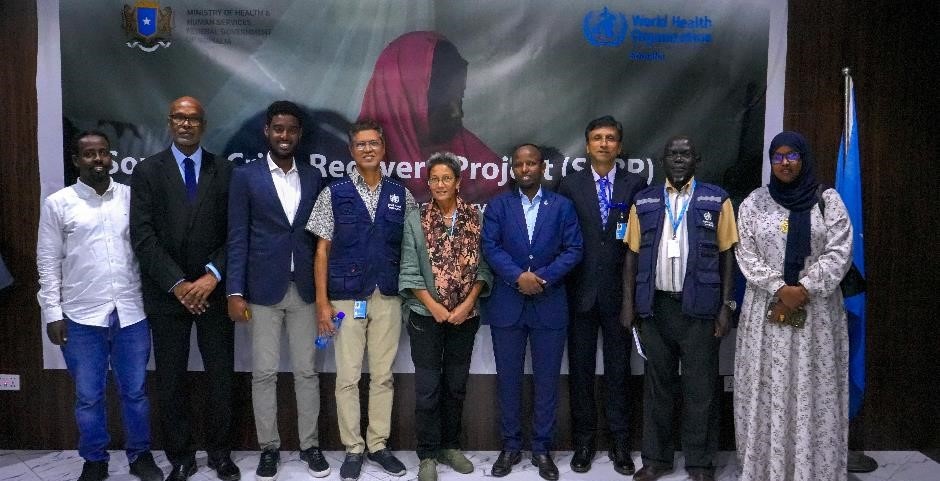 Participants at the project launch, Mogadishu, Somalia, 9 September 2023. Photo credit: WHO Somalia/I. Taxta
Participants at the project launch, Mogadishu, Somalia, 9 September 2023. Photo credit: WHO Somalia/I. Taxta
29 September 2023, Mogadishu, Somalia – The Federal Government of Somalia, through its Federal Ministry of Health and Human Services, has launched a new project that aims to strengthen the medical emergency services at federal and state referral hospitals. Critical care capacities will be a particular focus.The US$ 11.4 million project is funded by the World Bank under the Somalia Crisis Recovery Project (SCRP). The World Health Organization (WHO) will support the delivery of the ‘Strengthening the Medical Emergency Services at Federal and State Referral Hospitals’ project.
This collaborative initiative comes as the country’s health system grapples with high levels of communicable and noncommunicable diseases, as well as injuries and disabilities caused by ongoing conflict and widespread use of improvised explosive devices.
“We have started important work to strengthen Somalia’s emergency health care through the Somalia Crisis Recovery Project,” said Abdi Tawane, Co-Project Manager of SCRP, who is based in the Project Implementation Unit of the Federal Ministry of Finance. “By upgrading facilities, training staff and coordinating health services, we are building sustainable capacity to respond to health crises and serve citizens across the country. This targeted support will have a significant impact on Somalia’s health care system both now and in the future.”
Following the official launch, representatives of WHO, the Project Implementation Unit of the Federal Ministry of Finance, the Federal Ministry of Health and Human Services, and Federal Member States met to discuss the project implementation in detail.
Strengthening of critical care
The new project aims to get emergency, critical and operative care services up and running in 8 hospitals across the country. The selected facilities can then properly function as regional referral hospitals, delivering emergency and critical care services. This is part of the Government’s vision for delivering integrated health services as set out in the Essential Package for Health Services (EPHS 2020) for Somalia.
The project also seeks to strengthen the referral mechanisms between primary health care and higher levels of health care in the country for critical care support. This will establish a model integrated health care delivery system that can be replicated to meet every person’s health needs across the life course.
“This crucial component of the Somalia Crisis Recovery Project builds on the strong partnership between the Ministry of Health and Human Services, Ministry of Finance, the World Bank and WHO in Somalia,” said Dr Ali Hadji Adan Abubakar, Minister of Health and Human Services. “Somalia made great strides during the COVID-19 pandemic to strengthen national capacity to prepare for, respond to and recover from public health crises, with the support of partners like WHO and the World Bank. More action is needed to meet the immediate needs of the population and strengthen surveillance and laboratory systems to detect and respond to emerging public health threats.”
“Close collaboration among all partners and open reporting to our Project Implementation Unit will be vital to demonstrate governance and maximize outcomes for Somali citizens. With transparency and shared commitment, I’m hopeful this project will save many lives while also sustaining public trust in our institutions,” said Saleiman Sheik Umar, Director-General of the Ministry of Finance.
Dr Mamunur Rahman Malik, WHO Representative and Head of Mission to Somalia, recognized the commitment of the federal and state health ministries. “Using a health system approach, this project will underscore the need for greater investment in emergency and critical care services across Somalia, as highlighted in the recent resolution WHA76.2,” said Dr Malik. “Improving integrated emergency, critical and operative care services as a continuum of care is an important ingredient for achieving universal health coverage. Improving these services will also enable the country to be better prepared for and ready to manage critical care patients in any future pandemics and promote the enjoyment of health as a human right.”
About the Somalia Crisis Recovery Project
SCRP is a holistic project that supports recovery from past disasters while enhancing resilience to future shocks. SCRP recognizes how important it is to bolster Somalia’s health system as it responds to climate- and conflict-related crises.
For component 3 of SCRP, the Project Implementation Unit is working closely with the Ministry of Health and Human Services to pilot approaches for building resilience in the health sector. Emergency telehealth networks are being set up to ensure that remote populations can access care during disasters. Disease early warning systems are being upgraded to predict outbreaks, and community health workers are being trained in first aid and trauma response.
Innovative capacity-building of this nature will help Somalia’s health system to withstand future climate shocks. In this way, SCRP aims to lay the groundwork for more resilient health care nationwide and to support the basic right to health for all in Somalia in this challenging context.
For more information, please contact:
Somalia Crisis Recovery Project
Abdi Tawane
Co-Project Manager of SCRP, Project Implementation Unit, Ministry of Finance
Email:
Ministry of Health and Human Services
Bile Abdi
Communications Officer, Ministry of Health and Human Services
Email:
WHO
Kyle DeFreitas
External Relations Officer, WHO Somalia Country Office
Email:
Fouzia Bano
Communications Officer, WHO Somalia Country Office
Email:


